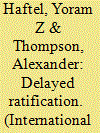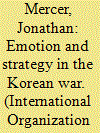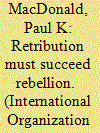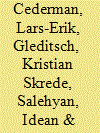|
|
|
Sort Order |
|
|
|
Items / Page
|
|
|
|
|
|
|
| Srl | Item |
| 1 |
ID:
120165


|
|
|
|
|
| Publication |
2013.
|
| Summary/Abstract |
The IR literature on hegemony rarely combines attention to material power and ideas. Cox's neo-Gramscian work is a rare exception, but it too narrowly construes Gramsci's conceptualization of common sense, reducing it to elite views on political economy. But Gramsci argued that hegemony had to reckon with mass quotidian common sense. If political elites do not take into account the taken-for-granted world of the masses, elite ideological projects would likely founder against daily practices of resistance. In this article, I show how mass common sense can be an obstacle to an elite hegemonic project aimed at moving a great power into the core of the world capitalist economy. In contemporary Russia, a ruling elite with a neoliberal project is being thwarted daily by a mass common sense that has little affinity with democratic market capitalism. Scholarly work on future Chinese, Brazilian, or Indian participation in constructing a new hegemonic order would do well to pay attention to the mass common senses prevailing in those societies
|
|
|
|
|
|
|
|
|
|
|
|
|
|
|
|
| 2 |
ID:
120166


|
|
|
|
|
| Publication |
2013.
|
| Summary/Abstract |
Some treaties are signed and then ratified quickly while others languish in legal limbo, unratified by one or more parties. What explains this variation in the time between signature and ratification? The international relations literature has not taken the ratification stage seriously enough, despite its obvious importance from a legal and a political perspective. We offer a systematic study of this question in the context of bilateral investment treaties. We develop and test a set of theoretical propositions related to domestic-level constraints on the executive, the varying ability of governments to rationally anticipate ratification obstacles, and the bilateral relationship between treaty partners. We generally find support for these propositions but report some surprising findings as well. The article presents implications for investment agreements and treaty making more generally, and raises a number of issues for further study at the intersection of international politics and law.
|
|
|
|
|
|
|
|
|
|
|
|
|
|
|
|
| 3 |
ID:
120162


|
|
|
|
|
| Publication |
2013.
|
| Summary/Abstract |
What makes a diplomatic or military signal credible? In strategic settings where deception is possible, rational actors' interpretations rely on their beliefs, intuition, and imagination-they rely on emotion. Two properties of emotion-as an assimilation mechanism and its use as evidence-are key to addressing four strategic problems. First, emotion explains why actors worry needlessly about their reputations. Second, emotion is important to understanding costly signals. Third, emotion explains radical changes in preferences. Fourth, emotion sharpens understanding of strategic problems without being self-invalidating: common knowledge of emotion's effects do not always change those effects. Understanding how rational actors think requires turning to emotion. Evidence from the Korean War captures strengths and weaknesses of competing perspectives.
|
|
|
|
|
|
|
|
|
|
|
|
|
|
|
|
| 4 |
ID:
120163


|
|
|
|
|
| Publication |
2013.
|
| Summary/Abstract |
What can explain the decline in incumbent victory in counterinsurgency wars? Political scientists offer a variety of explanations for these trends. Some focus on the structure and doctrine of counterinsurgent forces, while others emphasize the lethality and motivation of insurgent adversaries. I challenge these explanations. Declines in incumbent victory in counterinsurgency wars are not driven by fundamental shifts in the character of these conflicts, but in the political context in which they take place. Nineteenth-century colonial incumbents enjoyed a variety of political advantages-including strong political will, a permissive international environment, access to local collaborators, and flexibility to pick their battles-which granted them the time and resources necessary to meet insurgent challenges. In contrast, twentieth-century colonial incumbents struggled in the face of apathetic publics, hostile superpowers, vanishing collaborators, and constrained options. The decline in incumbent victory in counterinsurgency warfare, therefore, stems not from problems in force structure or strategy, but in political shifts in the profitability and legitimacy of colonial forms of governance.
|
|
|
|
|
|
|
|
|
|
|
|
|
|
|
|
| 5 |
ID:
120169


|
|
|
|
|
| Publication |
2013.
|
| Summary/Abstract |
We explore the impact of issue framing on individual attitudes toward international trade. Based on a survey experiment fielded in Argentina during 2007, which reproduces the setup of earlier studies in the United States, we show that individuals' position in the economy and their material concerns define the strength of their prior beliefs about international trade, and thereby mitigate their sensitivity to the new dimensions introduced in informational cues. Extending the analysis beyond the United States to a country with different skill endowments allows us to better explore the role of material and nonmaterial attributes on individual attitudes toward trade. We find that skill is a central predictor of support for openness. The effect is strongest for individuals in the service sector and in cities that cater to the producers of agricultural commodities. Our findings suggest that the pattern of support for economic integration reflects the predictions from recent literature in international economics that emphasizes trade's impact on the relative demand for skilled labor regardless of factor endowments. Our findings also amend recent empirical contributions that suggest socialization is the main factor explaining individual sensitivity to issue framing on trade preferences. We suggest that material conditions associated with income and price effects are crucial, both in shaping trade preferences and in affecting the malleability of attitudes to issue framing. Hence, our results provide a crucial contribution to our general understanding of the attributes shaping susceptibility to political framing in policy debates.
|
|
|
|
|
|
|
|
|
|
|
|
|
|
|
|
| 6 |
ID:
120164


|
|
|
|
|
| Publication |
2013.
|
| Summary/Abstract |
The rationalist-constructivist divide that runs through the discipline of International Relations (IR) revolves around two figures of agency, the rational actor and the constructivist "self." In this article I examine the models of agency that implicitly or explicitly underpin the study of international politics. I show how both notions of the rational actor and the constructivist self have remained wedded to individualist understandings of agency that were first incarnated in the discipline's self-understandings by Hobbes's natural individual. Despite its turn to social theory, this persistent individualism has hampered constructivism's ability to appraise the ways in which the actors and structures of international politics mutually constitute one another "all the way down." My purpose is to lay the foundations for a nonindividualist, adequately relational, social theory of international politics. To this end I propose a third model of agency, Lacan's split speaking subject. Through a Lacanian reading of the Leviathan, I show how the speaking subject has in fact laid buried away in the discipline's Hobbesian legacy all along.
|
|
|
|
|
|
|
|
|
|
|
|
|
|
|
|
| 7 |
ID:
120168


|
|
|
|
|
| Publication |
2013.
|
| Summary/Abstract |
A series of studies has shown that civil wars are caused not only by factors inside countries, but also by effects operating across state borders. Whereas a first wave of quantitative studies demonstrated that such effects make the "closed-polity" assumption untenable, more recently researchers have identified particular causal mechanisms driving conflict. Despite these recent advances, a central puzzle remains unresolved, namely why ethnic groups that at least in theory could count on support from large transborder ethnic kin (TEK) groups often have remained surprisingly peaceful, such as the stranded Russian populations in the "near abroad." We propose a theoretical framework that extends the analysis from the primary dyad between the incumbent and the challenger group by adding a secondary dyad that pits the incumbent against the TEK group. We postulate a curvilinear effect of the TEK group's relative size on conflict onset. Using a new data set on transnational ethnic links, we find that that the risk of conflict increases within the middle range of the size spectrum, consistent with our main hypothesis. This means that large TEK groups have a conflict-dampening effect, provided that they control their own state. Excluded TEK groups, however, are not associated with lower conflict probabilities.
|
|
|
|
|
|
|
|
|
|
|
|
|
|
|
|
|
|
|
|
|